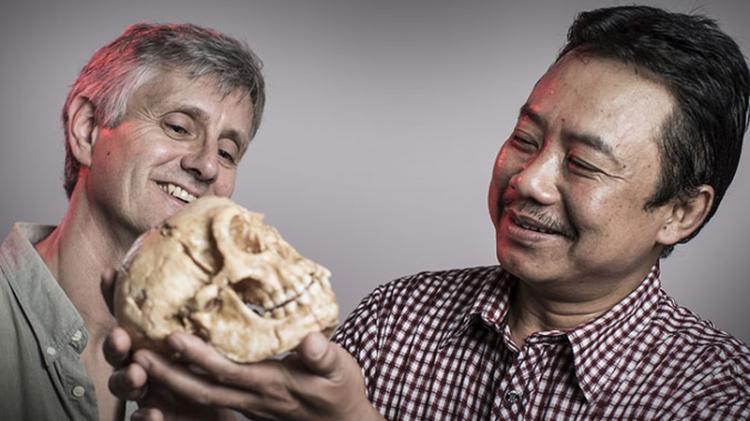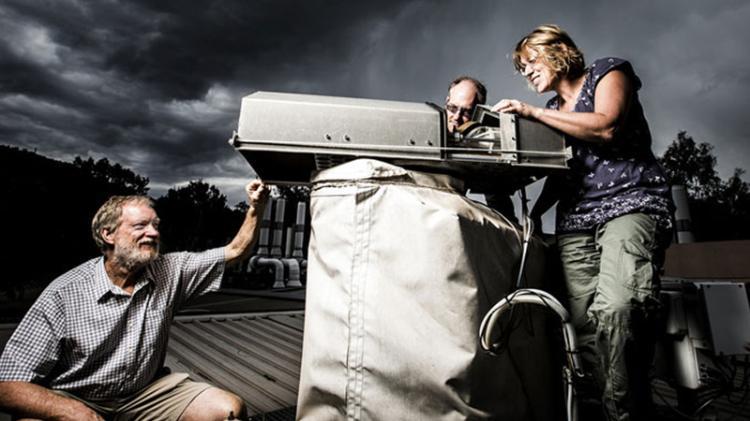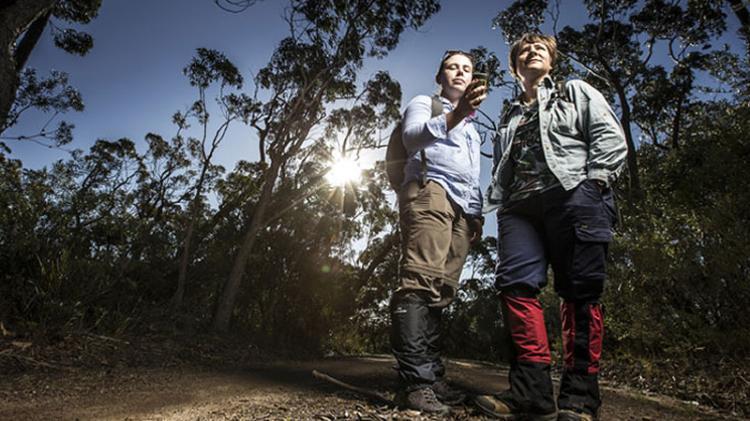Environmental Futures is a Research Entity focused on understanding the environment by describing the past, interpreting the present and projecting into the future. Environmental Futures brings together expert interdisciplinary researchers to enhance well-being and environmental sustainability. We undertake world-leading fundamental and applied research, bridging knowledge gaps and tackling real-world challenges spanning sustainability, climate change and human impacts. Working collectively enhances our predictive and explanatory capacity, allowing us to confront challenges holistically.
Vision
Impactful environmental research that informs and advises decision-makers, communities, and futures generations.
Purpose
Produce environmental knowledge through ethical partnerships and purposeful collaborations, by integrating our collective pursuit of enquiry with our diverse expertise, worldclass research facilities and inspired training.
The research activities of Environmental Futures are underpinned by core values that advance science and deliver on our vision and mission. Environmental Futures Research is:
- Impactful: Our research aims to inform and advise decision-makers, communities, and future generations.
- Evidence-based: Rigorous science and defensible knowledge will form the evidence supporting our research and its impact.
- Ambitious: Our research is ambitious, advancing knowledge and understanding.
- Diverse: Our membership reflects the diverse skills and expertise, career stages, and personal characteristics needed to advance environmental research.
- Ethical: We operate with honesty and integrity when undertaking research, including seeking accuracy and precision, transparency and accountability, knowledge sharing and attribution, and adhering to societal moral obligations regarding human and animal rights. We advocate for and follow principles of equitable access to resources.
- Inclusive: We welcome new members and foster partnerships and collaborations that align with the vision, mission, and values of Environmental Futures.





![]()
Primary members
- Dr Aimee Silla, Research Fellow
- Dr Alena Kimbrough, Research Fellow
- Associate Professor Alex Mackay, Academic
- Dr Alexandru T. Codilean, Academic
- Associate Professor Ali K M AL-Nasrawi, Research Fellow
- Professor Allen Nutman, Academic
- Professor Anthony Dosseto, Academic
- Dr Alison Haynes, Academic
- Dr Bethany Hoye, Academic
- Professor Bo Li, Academic
- Dr Christopher R Friesen, Academic
- Dr Claire Orlov, Academic
- Professor Clare Murphy, Academic
- Dr Damien Esquerre, Academic
- Dr Diana King
- Dr Johanna Turnbull, Academic
- Dr Eline Schotsmans, Research Fellow
- Dr Emma Asbridge, Academic
- Dr Gerrit van den Bergh, Academic
- Senior Professor Guang Shi, Academic
- Dr Haidee Cadd, Research Fellow
- Professor Helen Victoria McGregor, Academic
- Dr James B Dorey, Academic
- Dr Jeffrey Kelleway, Academic
- Dr Jiaxin Zhang, Research Fellow
- Associate Professor Katarina Mikac, Academic
- Dr Katharina J Peters, Academic
- Professor Kerrylee Rogers, Academic
- Senior Professor Kris French, Academic
- Dr Krystal Randall, Research Fellow
- Dr Lloyd White, Academic
- Dr Luke Gliganic, Research Fellow
- Dr Marian Wong, Academic
- Dr Melinda Waterman, Research Fellow
- Dr Nathan Jankowski, Research Fellow
- Narmilan Amarasingam
- Associate Professor Nicholas Jones, Academic
- Associate Professor Nicholas Deutscher, Academic
- Associate Professor Nicolas Flament, Academic
- Associate Professor Owen Price, Research Fellow
- Dr Paolo Sebastianelli, Research Fellow
- Associate Professor Phillip Byrne, Academic
- Ryan Dallas, Academic
- Dr Sam Lin, Academic
- Dr Sam Marx, Academic
- Dr Sangmin (Sam) Lee, Research Fellow
- Associate Professor Sarah Hamylton, Academic
- Distinguished Professor Sharon Robinson, Academic
- Dr Tara Clark, Research Fellow
- Associate Professor Tim Cohen, Academic
- Dr Ting Cheng, Associate Research Fellow
- Travis Naylor
- Dr Maximilien Desservettaz, Research Fellow
- Umair Iqbal, Research Fellow
Associate members
- Dr Amanda Guy
- Andrea N Johansen
- Associate Professor Andrew Zammit Mangion, Academic
- Annalise Cucchiaro, HDR student
- Ariella Arzey, HDR student
- Atul Kumar Rai, HDR student
- Dr Benjamin J. Henley, Research Fellow
- Bakhat Rawat, HDR student
- Bo Yang, HDR student
- Bridget Roberts, HDR student
- Brooke Conroy, HDR student
- Chris Gibson
- Senior Professor Colin Murray-Wallace, Academic
- Dr Cormac Faye, Research Fellow
- Courtney Hildebrandt, HDR student
- Daniel Colella
- Dipowiguno, HDR student
- Dominique Bally Kpokro, HDR student
- Dr Dominique Tanner, Academic
- Dulmini Jayanitha Liyanage, HDR student
- Elyse Stanes
- Faisal Hai
- Dr Florian Dux
- George Murray, HDR student
- Hasan Nawaz, HDR student
- Hrushi Kommula
- Hugh Forehead, Research Fellow
- Hugo Fahey, HDR student
- Isabelle Wolf
- Jasleen Singh
- Jasmine Hunter, HDR student
- Jen Smart
- Jennifer Atchison
- Associate Professor Jenny Fisher, Academic
- Jordyn Clough, HDR student
- Justin Takacs, HDR student
- Kira Lowe, HDR student
- Associate Professor Laurie Chisholm, Academic
- Leah Gibbs
- Maame Adwoa Maisie, HDR student
- Dr Manish Narsipura Sreenivasa, Academic
- Meagan Powley, HDR student
- Dr Michael Bertolacci, Research Fellow
- Nicholas Gill
- Nikolas Johnston
- Distinguished Professor Noel Cressie, Academic
- Pauline McGuirk
- Priscilla Van Wynsberghe
- Ryan North, HDR student
- Sandra Kornelia Koenigseder
- Santosh Dhungana
- Associate Professor Shu-Qing Yang, Academic
- Siobhan Heatwole, HDR student
- Associate Professor Solomon Buckman, Academic
- Sonia Graham
- Umair Mussawar, HDR student
- Zara Anastas, HDR student
Adjunct members
- Professor Barbara Anne Bollard, Honorary
- Brett Morrisey
- Associate Professor Brian Gordon Jones, Honorary
- Professor Colin Woodroffe, Honorary
- Professor Dana Michelle Bergstrom, Honorary
- Dr Megan Louise Williams, Honorary
- James Barker
- Dr Rafael C. Carvalho, Honorary
- Ross Bradstock, Honorary
- Dr Susan Hayes, Honorary













